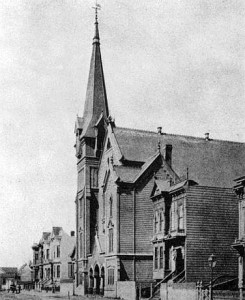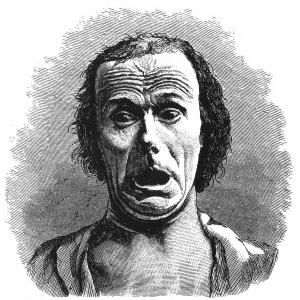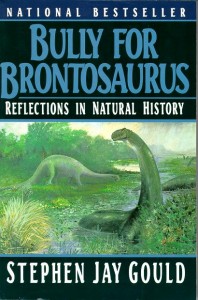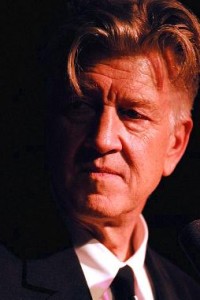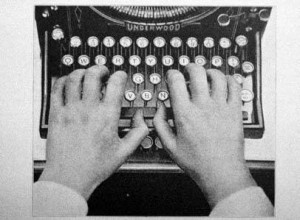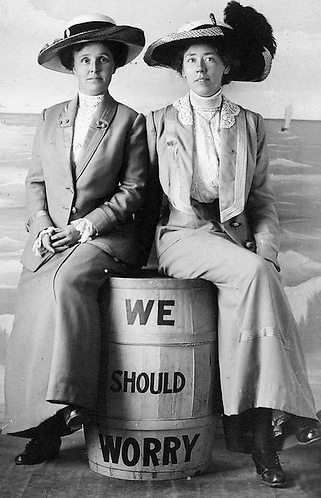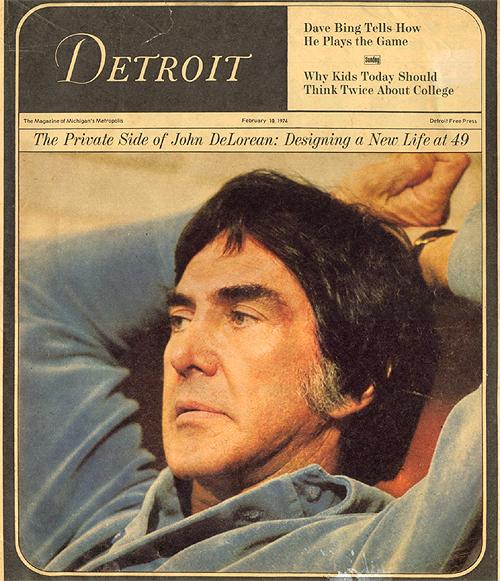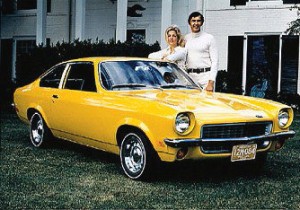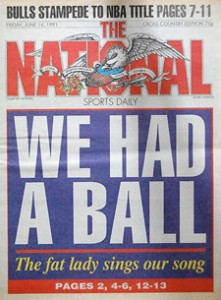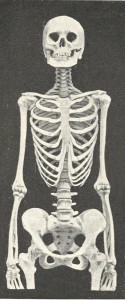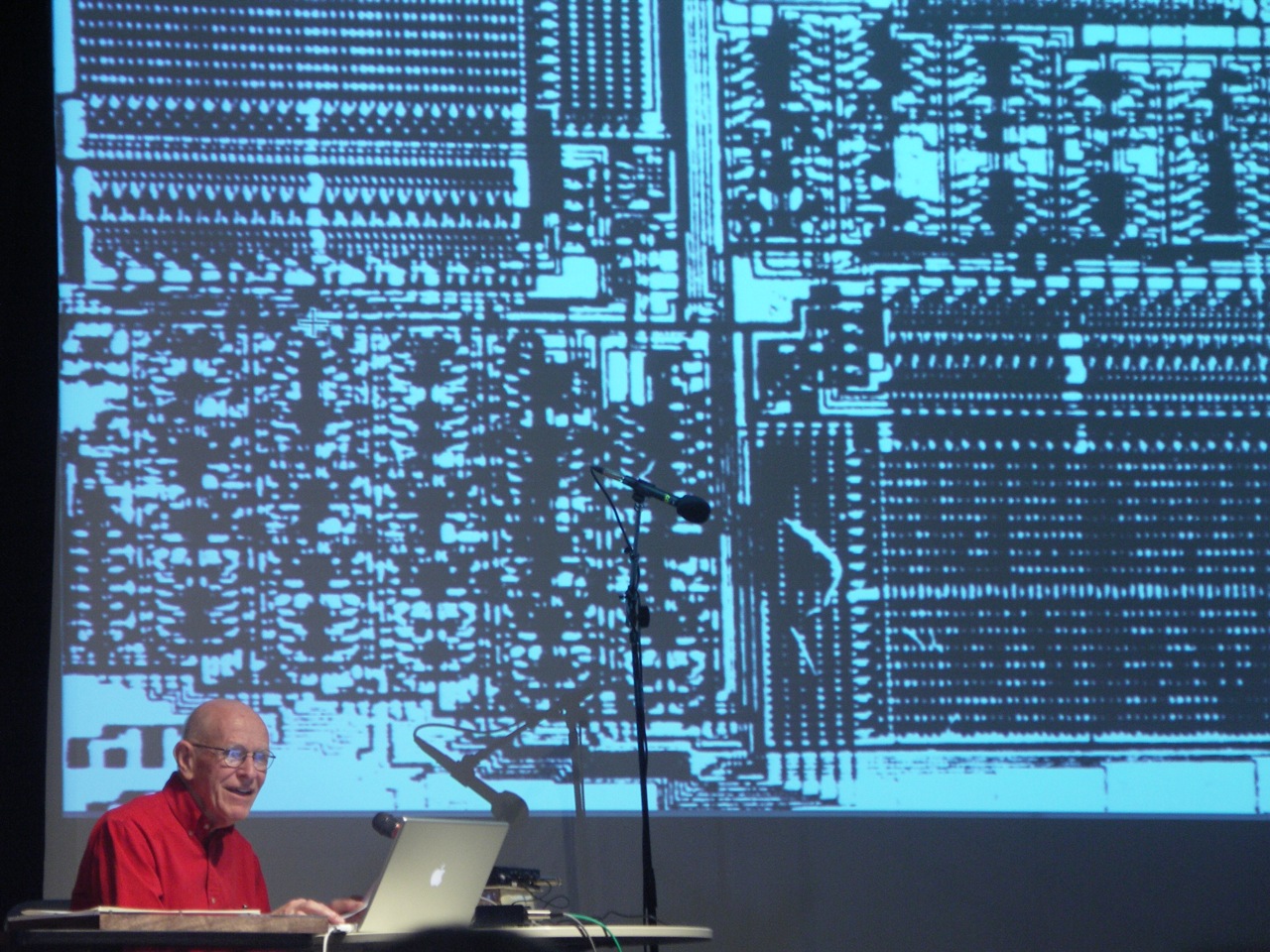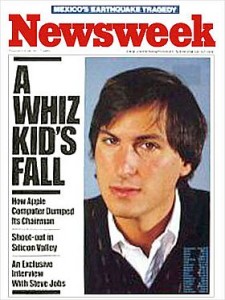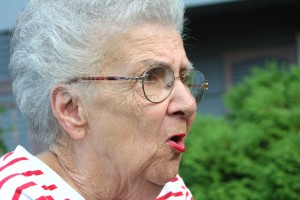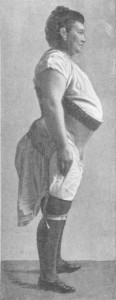I wonder if the recent economic meltdown would have cooled any of Friedman’s free-market fervor. Doubtful.
Tags: Milton Firedman, Phil Donahue
From “Larry Flynt at Home,” Jean Stein’s Los Angeles Review of Books recollection of the puke-inducing pornographer/Constitutional rights champion at the height of his powers in 1983, as he was planning a Presidential run. In this segment, screenwriter and novelist Terry Southern has been summoned to Flynt’s Los Angeles lair, by a wired Dennis Hopper, to work on a dubious film project about Jim Morrison:
“The next guy to arrive was Marjoe — you know, that guy who used to be a child evangelist. And the other person who was a permanent guest for the moment was Madalyn Murray. Madalyn Murray has devoted her entire life to trying to get the Bible outlawed in school. She’s a professional atheist, very courageous. For some reason Larry Flynt was interested in her cause. I think he wanted to fuck her … mind-fuck her I mean.
About 4:00 P.M. Larry Flynt comes in and says, ‘Sundowner time. Time for a sundowner.’ He’s in a wh
eelchair. His wheelchair is motorized and gold-plated, and it has little American flags like on an ambassador’s car. He’s wearing this big diaper he had made up from an American flag. ‘They treat me like a baby,’ he said, ‘so I’m going to behave like one. And if I poo-poo in my diaper, I’ll be poo-pooing on the American flag.’ He’s trying to explain this to this huge Indian — what the hell is his name? He’s a great Indian guy who’s about seven feet tall … Means, Russell Means. He’s there, and meanwhile I hear this shouting, and it sounds like a big argument, but it’s just Liddy and Tim Leary rehearsing their act, I mean their ‘debate.’ About time for dinner, Frank Zappa arrives, you know him. Quite a grand zany. So there’s this very long table of odd people.After dinner Larry said, ‘Come into my study, Terry, you’re going to need some money for the weekend.’ We went into his office and he said, ‘There’s a briefcase by the couch where you’re sitting. Put it on your lap and open it.’ So I did. It was full of packs of hundred-dollar bills. Larry said, ‘It’s a million dollars. I have this on hand to give validity to the offer.’ And he showed me this circular: A standing offer from Larry Flynt to the following women who are prepared to show gyno-pink. One million cash to Barbara Bach, Cathy Bach, Barbi Benton, Cheryl Tiegs … They were mostly kind of obscure, but there were one or two that were totally out of place, like Gloria Steinem and Jane Fonda. He was offering them a million dollars if they’d pose and do a gyno spread, what he called ‘flashing pink.’ And so he said, ‘Take whatever you think you’ll need for the weekend,” and he made a point of turning around to use the phone so I could take what I wanted. When he finished his call, he asked, ‘How much did you take?’
‘Two hundred dollars.’
‘You must be a fool — you could have taken more.’
I said, “I don’t think I need any more than that.’
‘Well, I like an honest man,’ he said.”•
_____________________________
Larry Flynt, the First Amendment champion:
Tags: Frank Zappa, G. Gordon Liddy, Jean Stein, Larry Flynt, Madalyn Murray O'Hair, Marjoe, Russell Means, Timothy Leary
The final major lecture by that Pistols-promoting Malcolm McLaren.
Tags: Malcolm McLaren
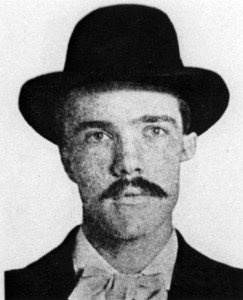
"Theodore Durrant was this morning for the second time sentenced to be hanged." (Image by Jay Robert Nash Collection.)
The sensational Durrant trial of 1895, in which a medical student was accused of committing a pair of murders in the Emmanuel Baptist Church in San Francisco, brought the city to a standstill and generated national news attention. The following are excerpts from stories about the case that appeared in the Brooklyn Daily Eagle.
••••••••••
“Durrant and Miss Williams” (April 23, 1895): “The preliminary examination of W.N.T. Durrant, the medical student accused of murdering Miss Marian Williams in Emmanuel Baptist Church, on the night of April 12, was resumed this morning. There was a new witness, who gave most damaging evidence against him. It will be remembered that Durrant had strenuously denied having met Miss Williams for three weeks prior to her death. There has been evidence that he was seen in the vicinity of the church that night by one man, three girls and a woman, but only one of these, a young girl, has stated that she recognized Durrant, but her testimony is weakened by that of a companion, who was with her at the time, and failed to recognize the prisoner in court.”
••••••••••
“Damaging to the Pastor” (April 25, 1895): “A new discovery in the Durrant case has been made. When the body of Minnie Williams was found in Emmanuel Church, in searching after traces of the murderer, the police and reporters found a dark stain on the door of the Rev. Dr. Gibson’s study, to which he only, so far as known, had a key. The police say the stain was merely varnish and have paid no further attention to it. Yesterday, however, a reporter shaved off a portion of the varnish stains and a microscopic examination showed it was blood instead of varnish.”
••••••••••
“Police Stop the Play” (July 30, 1895): “The production of a new play entitled The Crime of a Century, which was placed on the stage of the Alcatraz theater last night, was stopped in the middle of the third act. Just at the point when Debois, the character who is supposed to impersonate Durrant, was about to drag a woman to the belfry of a church, Sheriff Whelan and his deputies marched on the stage and arrested the performers, eleven in all. The manager of the theater was also placed under arrest.
The manager stepped before the curtain and made a speech in which he claimed that he had a right to produce the play. He was taken into custody nevertheless for disobeying the order made by Judge Murphy restraining him from putting the piece on the stage. A great crowd attended the performance, which was hissed at intervals. The whole company spent the night in jail.”
••••••••••
“Durrant Writes a Book” (November 6, 1895): “Theodore Durrant has written a sketch of his life and ambitions and has gone into the matter of how it feels to be on trial for murder. He has some flings at the curious people who stared at him, takes the churches to task for what he thinks is their lack of Christianity, and says that his self possession, nerve and fortitude during the trial were due to the love and comfort given him by his mother. He stoutly proclaims his innocence and satirizes some of his critics.”
••••••••••
“Durrant Resentenced” (April 11, 1897): “Theodore Durrant was this morning for the second time sentenced to be hanged for the murder of Blanche Lamont in Emmanuel Church two years ago. He will be hanged at San Quentin prison on June 11.”
••••••••••
 “Hallucinations of a Hangman” (November 7, 1899): “Amos Lunt of San Quentin is going to a sanitarium, a victim of insomnia and something like nervous prostration, but it is doubtful if it will do him any good. Lunt is the hangman of the San Quentin prison, with a record of twenty executions in five years, and his present condition is induced by hallucinations. Every time he falls into a doze he sees the spirits of some of the murderers whom he has hanged, especially the spirit of Durrant, who murdered two girls in a church, and the hunchback John Miller.”
“Hallucinations of a Hangman” (November 7, 1899): “Amos Lunt of San Quentin is going to a sanitarium, a victim of insomnia and something like nervous prostration, but it is doubtful if it will do him any good. Lunt is the hangman of the San Quentin prison, with a record of twenty executions in five years, and his present condition is induced by hallucinations. Every time he falls into a doze he sees the spirits of some of the murderers whom he has hanged, especially the spirit of Durrant, who murdered two girls in a church, and the hunchback John Miller.”
•••••••••••
“The Death Penalty” (August 16, 1901): “There is a growing appreciation of the fallibility of circumstantial evidence, as well as of the uncertainty of witnesses. The terrible fate which sent young Durrant to the gallows for a murder of two girls, committed by the pastor of the church in which their bodies were found, has its effects on minds disposed to caution, if not to mercy.”
Tags: Amos Lunt, Theodore Durrant
Dennis Kucinich interviewed in a Cleveland diner in 1978 by that one-man windstorm Tom Snyder.
Tags: Dennis Kucinich, Tom Snyder
MY LIFE STORY- CHAPTER ONE
(CHAPTER 1- THE EARLY YEARS – (Title subject to change)
On April 22, 1954, my mother, at Doctors Hospital in Brooklyn New York gave birth to a bouncing 7 pound 15 ounce boy who she named Steve. It was a joyous day for her and her husband Sidney. However, the only party who wasn’t thrilled by the birth was Steve himself. What right does anyone have to put someone on this earth without their permission? I never asked to be conceived and I regret that I was ever born. Little Steven Jay, as innocent as can be when he was born, without a trouble in the world, would grew up to have a life which you wouldn’t wish on anybody. Why even be born if you are going to face such a life? All babies when born are the parents’ little gifts. I never really understood what was so wonderful about this concept of having a child. It means at least 18 years of your life to raise them. You have to sacrifice your life for the sake of a child. My parents met when my mother spilled some coffee on herself in a restaurant and my father came to her rescue. At least that is what I was told. It figures that they would meet like this. Maybe this is the reason I have grown up to like coffee so much.
Considering the circumstances that have occurred in my life I should hate coffee because that is the reason I was conceived in the first place. If they never met, I would not have had to endure this miserable life. If my father’s sperm decided not to meet my mother’s egg, I wouldn’t be here right now telling you this story. Since there was nothing i could do about being born as I couldn’t go back into the womb and undo myself, I guess I had to become a part of on this Earth, like it or not.
My childhood years are very vague to me. For whatever reason my memory fails me regarding the details of my early years. I have much more recollection of my years following high school. However I do remember certain things about how i grew up and how my life evolved up until when I
was 18 years old. None of it was very promising and was only an indication of how the rest of my life would go.
I grew up in Boro Park, Brooklyn which was a middle class neighborhood in which Hasidic Jews were the majority of the population. I never did understand anything about religion nor did I care. Fortunately for me, my parents while they observed the Jewish religion were not deeply religious so they did not follow all the customs of many of those in the neighborhood. Boy am I glad that my father didnt wear curls, a yarmulke on his head and a stupid looking black hat. If I was ever brought up as a Hasidic Jew that would be the 2nd thing that was forced on me in my life, the first being put on this Earth in the first place.
As has been the case most of my life I have never had many friends. This all started right from the beginning. I went to Public School 131 and I remember some of the times there and some of the teachers and classmates that I liked. I will never forget little Susan, my first love in first grade. She was so cute. I look at my old class picture and see that I was sitting next to her and there is another picture with me holding her hand in a dance. To this day I always wonder whatever happened to her but have been unable to locate her on any social networks, etc. She is the closest thing I ever had through high school that you could call a “crush”. I also liked a girl named Karma but Susan was my favorite. I didn’t really have much interest in girls. I guess I was too busy studying and getting good grades. I was always one of the smart kids in the class and the one that was picked on. I guess elementary school was OK for me except some incidents that were embarrassing. The fact is that I was a quiet kid and was afraid to raise my hand for anything until later on, perhaps starting in junior high school.
I was always afraid to draw attention to myself . I had a few instances in which I didn’t tell my teacher that I had to go to the bathroom and “wet my pants”. Sometimes there was no “puddle” on the floor so I thought nobody knew that I did it but of course you have those with sensitive noses and they could smell it. They made fun of me for pissing in my pants. It was truly embarrassing to me. I don’t remember what happened when I got home or if they even called my mother to let her know what I had done. I guess they would have had to let her know. I couldn’t continue my day in school with pissed up pants. I know she would have given me a whipping or screamed at me. This didn’t only happen at school as I also was a “bedwetter”. When I had my own room and my own bed, I used to piss it up every once in awhile and I hoped that my mother didn’t find out before she would probably stuff the sheet near my nose for me to smell it. I used to run a fan near the wet spot and get a wet rag to try to get the smell out. While Im sure she knew I did it, she didn’t come down on me for it. Once again this must have been a sign of things to come as in my later life I would also have such problems.
While I don’t remember too much about the relationship with my mother I do know that she used to get on my case about things such as my hygiene, sitting in the house by myself and not having friends, among other things. She was more partial to my older sister, Francine, who was 2 years older. My mother was the dominant parent and my father very passive, sometimes you didn’t even know he was there. He went to work every day and my mother took care of the other things. Things started in my childhood regarding the laziness I would have my entire life in taking care of myself. I never liked to take baths and whenever my mother told me to take one, I ran the water and made believe I was doing so. This would be the beginning of bad hygiene that I would have for my entire life to this day which caused many more problems down the road as I got older and started dealing with women, etc. Usually when a child says bad words or curses, the mother threatens to wash their mouths out with soap. My mother threatened to do that if I didn’t take a bath. Even with those threats which she never acted on anyway, I didn’t bathe. What does soap taste like anyway? Maybe they should make it in flavors.
My life went pretty normally through elementary school and onto junior high. The highlights of my childhood were buying chocolate egg creams at the local candy store as they called them in those days, buying penny candy, and a nickel for a pickle from a barrel. Also I do recall the days of stoop ball, stickball, flipping baseball cards and playing with bottle caps. Also, 12 cent comic books and 5 cent newspapers. I admit to a few crimes in my childhood. One occurred one day when in a candy store it just seemed so easy- I had bought a newspaper and I wanted some comic books but had no more money. Wow- the guy in the store wasn’t looking so I thought it would be easy to just stuff some comic books in the newspaper and walk out of the store. I did it and wasn’t caught. I feel guilty to this day about stealing but as it turns out that wasn’t the last of my criminal life. These were things that we wish we could have now. Life was great at least for the moment anyway. I had one close friend named Joel. We were the smart ones from the class. We hung out a lot and I stayed over his house several times, probably the only times I slept over anywhere in my life. He later disappeared never to be found again.
It was about the time that I was 12 years old and moving towards 13 and had to worry about my Bar Mitzvah. I was hardly your typical Jewish boy. I had no interest in the religion but my parents made me go to Hebrew school and have my bar mitzvah. I was miserable going to that school, and eventually dropped out. I had no interest in drawing and reading those weird Jewish symbols that remind me of Chinese. How Jewish people read that I haven’t a clue. I guess I must’ve been able to in order to read my speech at my ceremony. Private Bar Mitzvah lessons were arranged for me. I didn’t even have a clue as to what it meant to have this done except supposedly when you turn 13 and do it, you become a man , whatever that means. The age of 13 sounds way too young to me to be a man anyway. Well that was the end of it for me. I had the ceremony, I was supposedly a man and that would be the last time in my life I had anything to do with the Jewish religion. I wore a white yarmulke and wore all the religious attire. I was glad to get that nonsense over with.
Things went relatively well in Junior High school which I loved because I lived right around the corner from the school and could come home for lunch and watch some great TV in those days, the original Jeopardy and the Who, What or Where Game and a sandwich waiting for me in the refrigerator. That was the life. If only life was so simple later on. While I didn’t have many friends in Junior High as is the norm, I did like some of my teachers and it was pleasant to go to school. I got my best grades there. I was always a good student but I excelled in 7th to 8th grade. I loved Math and Spelling. I was terrible in gym. The only reason I passed was showing up and being in uniform. I was never the athletic type and always tried to hide from doing any activities. The other kids made fun of me because I ran slower than others and couldn’t do anything. That’s ok as I was used to being harassed. At one time I almost made it to the city Spelling Bee finals. I was so excited but then was eliminated because I couldn’t spell such a simple word as “bouquet”. This was one of the few times in my life I showed any emotion. I am basically an emotionless person and have shed few years. Perhaps when I was a young child I cried but I don’t even remember those days. They pronounced the word as if it was spelled “boquet” and that’s how I spelled it. I was so disappointed. I was ready to go to Madison Square Garden for the Finals . If I had continued the next word which would have been mine I would have spelled correctly. I remember my mother was there. I hardly remember my father doing anything at all until later on. I guess he was at work but he never got involved with much.
I had a lousy family life. While I had a sister, it doesn’t seem as though we had a close relationship either and that would continue in the future as other things broke us apart. The only family events really were on Sundays when we went to my grandmother’s and an aunt , uncle and cousin came by as well. It was almost a regular thing. However, that was pretty much the extent of it. We weren’t a close knit family. I really didn’t like my mother because she always yelled at me and favored my sister. I was closer with my father but only remember such things as sitting down to breakfast with him when he started me out early with coffee which I drank from this tall “coffee glass”. I also remember he wore almost the same clothes to work every day and wondered why he never bought any other colors but boring brown.
Things started to go on the downhill for me after I graduated Junior High. While most of those classmates that I went there with went to one high school I had to go to another because I lived on the other side of the border so basically I was going to a high school where there would be nobody that I knew and that only led to problems later on. I was very unhappy there and my grades suffered. I still go decent grades but wasn’t making any Honor Rolls or Arista groups. I got more and more disenchanted and it reached a head in my last year at Lafayette High School. It was 1972 and my mother had contracted stomach cancer. It was a very depressing time at home with all the pain and screaming that my mother was going through and the fact that she was fussing with my father because she was sick. At the time I really didn’t understand how sick she was. I was 17 years old then and really didn’t have an understanding of cancer and how some of those diseases were fatal. I had no idea how seriously ill she was. She had surgery and it seemed as though they had taken it all out but the reality was that the cancer returned and it was worse than ever. She was absolutely screaming in agony.
During this time I was also going through being harassed at school by some creeps in my class. They were calling me names and getting on my case because of my hygiene issues. I wasn’t the cleanest kid in the world and didn’t use deodorant, didn’t brush my teeth , etc. They tortured me all the time calling me such names as “Fleas”. I just couldn’t take it anymore. I had reached the end of my rope with going to school and being harassed each and every day by these little punks, especially Anthony a nerdy looking piece of garbage with thick glasses. I wanted to break those glasses so bad, he was so annoying.
Finally around March I stopped going to school. I just couldn’t take it anymore. I don’t really remember the exact circumstances of what went on with the school. What I did was to leave for school as I normally would. However, instead of going there, I would jump on a train and basically ride the subways all day long until it was time for me to come home. I loved the subways at that time and always dreamed that one day I could ride every single train and go through every single subway stop in the system like some others had done. However, that plan was derailed because I got scared of riding trains in bad neighborhoods. It pretty much went on a good 6 to 8 weeks before anyone at the school contacted my parents to let them know that I had been absent for an extended period. I don’t have a clue what took them so long. I was thinking that I would never graduate because I missed so much time.
My father finally did something because my mother was ill and couldn’t act on it but I believe she knew about it. It was arranged that I would have a tutor come to my house and I would complete my school year this way. I would also end up taking my finals and Regents exams at home. Sometime in this period while I was being tutored, my mother passed away from the malignant tumor in her stomach. I know this is very hard to say but it was a relief that she passed away because she was suffering way too much and now finally she would have peace. Very strangely when the funeral was held, I did not get emotional. I did not cry. I really cannot explain it but somehow it seemed as though I was happy that my mother was gone. Terrible thing to say but true. We just did not get along. As it turned out, in the future, my life would have been totally different if my mother survived. I never would have been able to do the things I did or be involved with the people in my life. My mother was a racist and never would have let me deal with black people. Little did she know what was to occur in my life. She is probably spinning in her grave if you believe in such things. My life continued on after her death in a way that she would never approve of. My father, being the passive parent he is didn’t seem to care and I basically did what I wanted to do.
After high school, I was so fed up with being harassed, etc, I figured I’d never move on to college as there was no way that I could picture myself being on a college campus with all those students and be able to deal with them. I really didn’t know what to do with myself. Finally what I decided to do in the fall of 1972 was to attend a vocational school for which I had seen an advertisement for. It offered a course in computer programming and upon completion you would receive job placement assistance. It all sounded good as an alternative to college and I might even be able to get a job when I was finished. The course was less than a year. I completed it in 8 months and got my certificate. There was something weird about the school as, even though we learned a lot of the programming skills we never actually worked hands on with a real computer. Yes we were tested on computer languages, flow charts, etc, and I passed the course but upon graduation, what exactly was it going to get me? Twenty four hundred dollars down the drain. My father paid for the course. There was no student loan. As far as the job placement service went, it was all a scam. They never did really send you out to a job that you were qualified for. You were instructed to put down a false company name and address as job experience using the schools telephone number and they would act as your prior employer. What the school failed to tell you was that along with the course, you also needed a college degree, which I did not have. I was extremely upset and wanted to sue the school but my father didn’t want to go through that process. It was a rip-off. That was the era of the vocational school scams . Unfortunately I was caught up in it.
If I thought I was lost before when I got out of high school and didn’t know what to do, now I was really lost without a hint as to where to turn now. I was out of options and in my mind out of luck. My life seemed hopeless, a familiar feeling that would continue for as long as live. This brought me to the next segment of my life in which things got even more complicated. At this point I had only a high school education ,a useless vocational school certificate, no friends to speak of and little hope. One thing I still had was my virginity, however, but that would change as well. This was the spring of 1973. Over 38 more years of misery was on the horizon.
No too many paleontologists make the pages of People magazine, but the late Stephen Jay Gould was a serious academic who crossed over into the mainstream. The Queens-born Harvard professor was a lightning rod for others who disagreed with his theories, but Gould was someone who continually questioned himself, often revising beliefs from early essays in subsequent ones. An excerpt from Michelle Green’s 1986 People profile:
“It is an inviting, vaguely antic enclave that suggests a 19th-century natural history museum turned into a bookish boys’ club. Faded lettering on the drab green walls announces ‘Synopsis of the Animal Kingdom’ and ‘Sponges and Protozoa,’ and in the room’s cluttered depths are a wealth of musty treasures: tall glass cases filled with drawers of trilobites, a towering painting of a tyrannosaurus, hundreds of leather-bound volumes and boxes of snail shells. A worn rattan chair has been pulled up to a worktable that holds fossils, microscopes and a supply of Pepperidge Farm cookies.
Stephen Jay Gould—evolutionary biologist, prolific writer and die-hard Yankees fan—has worked in this office at Harvard’s Museum of Comparative Zoology for 17 years, and many of his books have been spawned here: Ever Since Darwin, The Panda’s Thumb, Hen’s Teeth and Horse’s Toes and now The Flamingo’s Smile (Norton, $17.95). When he arrived with his freshly minted Ph.D. from Columbia, the rumpled, kinetic Gould was an exceptionally promising paleontologist; in the years since, he has become a popular symbol of erudition and scholarship. At 44, he recently completed the final year of a MacArthur Foundation grant that has paid him $38,400 a year since 1981. He was the recipient of an American Book Award in 1981, a National Magazine Award in 1980 and once made the cover of Newsweek. He has done battle with creationists, testified before congressional committees concerning nuclear winter and lectured in South Africa on the history of racism. Students fight to get into his classroom, and assorted crazies send tirades addressed to Mr. Illustrious Historical Professor Jay Gould, University of Harvard.
On this stone-gray afternoon, the illustrious historical professor is finding all the attention a bit of a problem. His secretary is putting through calls approximately every two minutes, and Gould—an ebullient man with a near-perpetual smile—is simultaneously trying to discuss his life’s work and fend off a flood of petitioners. On his desk is the latest batch of correspondence, including a letter from a man who suggests a connection between AIDS and aspirin, and a plea from the husband of a woman who is addicted to Gould’s columns in Discover:: Will the author please send birthday greetings to the following address? This nets the correspondent a hastily scrawled turndown: ‘I am not public property, but a man!'”
Premiere magazine, which published from 1987-2007, offered first-rate reporting about the movie industry for a good, long time, until corporate interference reduced it and destroyed it. One of its last gasps of greatness was “David Lynch Keeps His Head,” David Foster Wallace’s 1996 on set-reportage about the mystifying filmmaker as he made the equally inscrutable Lost Highway. An excerpt:
“The first time I lay actual eyes on the real David Lynch on the set of his movie, he’s peeing on a tree. This is on 8 January in L.A.’s Griffith Park, where some of Lost Highway’s exteriors and driving scenes are being shot. He is standing in the bristly underbrush off the dirt road between the base camp’s trailers and the set, peeing on a stunted pine. Mr. David Lynch, a prodigious coffee drinker, apparently pees hard and often, and neither he nor the production can afford the time it’d take to run down the base camp’s long line of trailers to the trailer where the bathrooms are every time he needs to pee. So my first (and generally representative) sight of Lynch is from the back, and (understandably) from a distance. Lost Highway’s cast and crew pretty much ignore Lynch’s urinating in public, (though I never did see anybody else relieving themselves on the set again, Lynch really was exponentially busier than everybody else.) and they ignore it in a relaxed rather than a tense or uncomfortable way, sort of the way you’d ignore a child’s alfresco peeing.”
••••••••••
Trailer for Lost Highway:
More David Foster Wallace posts:
Tags: David Foster Wallace, David Lynch
Top comment for this video on Youtube: “I wonder what it would look like if you put Piers Morgan through it, feet first.”
Tags: Piers Morgan
Some search-engine keyphrases bringing traffic to Afflictor this week:
- Old Print Articles: Chang and Eng pass away (1874) + Young tailor gets too close to his stepdaughter (1888).
- Featured Videos: Dick Cavett interviews Jean-Luc Godard (1980) + Tom Snyder interviews Divine (1980) + Marshall McLuhan discusses religion and communications + Ingrid Bergman talks about the travails of making Casablanca + Steve Jobs discusses the future (1985) + Paleontologist Jack Horner wants a pet dinosaur + Profile of the young Leonard Cohen (1965) + Two brief, beautiful films by Jean Painlevé + Spy glasses that transmit video in real time.
- Recently Posted on NYC’s Craigslist: I keep seeing Fidel Castro in Central Park + I’m selling a human skeleton but it’s okay + Prom is tomorrow and I need to earn money for a tux + I am a wiseass who is raising a child just like me.
- Great 1974 profile of a mid-career John DeLorean.
- Arthur C. Clarke reveals the unlikely inspiration for the opening scene of 2001: A Space Odyssey.
- Luc Sante remembers his days living in NYC tenements.
- Scott Carney’s devastating new book reports on modern-day flesh peddlers.
- Two sad scenes of American desperation.
- NUVIGIL will make modern life more tolerable, if it doesn’t harm you.
- Adam Curtis examines the rise of the machines.
- Gurgaon, India, is one of the most unusual cities in the world.
- Bill Simmons’ new site looks back on the short-lived National Sports Daily.
- Rent a grandma for all your grandma needs.
- Max Mathews was the pioneer who made computers sing.
- The world’s greenest city is to be built by Panasonic in Japan.
- What happened when George Plimpton tried out for the Detroit Lions.
- What happened when David Foster Wallace took luxury cruises.
- The promising start of pen-based computing in 1987.
- What obesity looked like in the 1800s.
John DeLorean remade the automotive industry, remade himself and eventually made a mess.
The opening of “The Private Side of John DeLorean: A New life at 49,” a great 1974 Detroit magazine cover story written by Paul Hendrickson, which profiled the legendary automaker after he exited the corporate car culture to blaze his own trail but before his head-on collision with hubris:
It begins like a parable. A skinny kid from inner-city Detroit grows up in the ’40s playing Slide the Rock and sandlot baseball and sometimes the clarinet. His father is a set-up man at the Ford foundry. His mother, separated from her husband, lives in California.
The boy is crazy for cars, dreaming of them every day as he rides a trolley down Woodward on his way to Cass Tech. Growing like a weed, he enters Lawrence Institute of Technology, graduates in engineering and, in 1948, begins a 25-year career in the automobile industry. Along the way, he picks up two master’s degrees, a wife from northern Michigan and 200 patents, including the recessed windshield wiper, the hidden radio antenna and the overhead-cam engine.
His rise at General Motors in meteoric. In 1965, at age 40, he is made general manager at Pontaic and a vice president. At 44, he becomes the youngest man ever to direct Chevrolet. Three years later, in October, 1972, he is named head of all GM’s car and truck production. His salary, including bonuses, is said to be $650,000. He is most everybody’s odds-on favorite to one day become president.
But here, the story takes a swerve. For by 1972, John Zachary DeLorean was a different breed of cat than the naive, callow youth who entered the business with the conviction that making cars was his calling to help Americans preserve their fifth freedom, mobility. For one thing, he had drastically changed his lifestyle.
He had taken to turtlenecks and tie-dyed blue jeans by then. His weight was down from 235 to just over 170. His hair was long and sculptured and dyed coal-black. There were well-founded stories that he had undergone a face lift. His three-to-four-pack-a-day cigarette habit was gone, as were the suits that came off the rack, as was the first wife. He had also married and divorced actress-model Kelly Harmon, 24 years his junior, and had popped up around the country in the company of Ursula Andress, Nancy Sinatra and Candice Bergen. When in Detroit, he had been known to roar around in such non-GM models as a Lamborghini and a $19,000 Maserati Ghibli. On occasion, he shocked everybody at the office cold by coming to work in a pickup.
He was playing golf with Arnold Palmer and Gary Player, riding motorcycles in the Mojave Desert, chasing girls with one-time auto racer Roger Penske and collecting real estate as if America were his Monopoly board.
In short as Time magazine put it, by 1972 John DeLorean was standing out from his colleagues at GM like a Corvette Stingray or a showroom full of trucks.
But more than any of that, DeLorean by then was just plain disenchanted with his job. He had said at a press conference two years earlier that he did not intend to spend the rest of his life at GM; few believed him.•
John DeLorean’s combustible 1980s, in four videos.
Mesmerizing 17-minute DeLorean DMC-12 prospectus film that was shown to dealers and investors ahead of the automobile reaching the market in 1981.
From Pennebaker and Hegedus in 1981: “John Zachary DeLorean doesn’t smile very much.”
A 1983 California ad offering DeLoreans at the closeout price of $18,895. “This may be your last chance to live the dream.”
In 1988, his dreams dashed and reputation destroyed, DeLorean was living in Manhattan, now a born-again Christian, still believing he would get another chance. He granted a rare interview to a local TV station from his old stomping grounds in Detroit.
Tags: John DeLorean, Paul Hendrickson
Panasonic and eight other companies plan to build the Fujisawa Sustainable Smart Town, the world’s greenest, cleanest community. However, where you live it will still be very filthy. (Thanks Singularity Hub.)
Grantland, Bill Simmons’ new online venture, has a fun oral history about the The National Sports Daily, a star-making and star-crossed newspaper edited by Frank Deford that burned brightly and burned out too soon in the early ’90s. An excerpt about how a Mexican billionaire started the paper on a whim:
“Frank Deford (Editor-in-Chief): I had never heard of Emilio Azcárraga. Very few people had, despite that he was the richest man south of the Rio Grande.
Thom Potraz (Marketing Director): If you went to central casting and asked for a “Mexican Billionaire,” they’d give you Azcárraga.
Dave Kindred (Associate Editor; National Columnist): They called him … El Tigre.
Peter Price (Publisher): It all started in the spring of 1989. Azcárraga wanted to have lunch. I’d heard about Emilio from Televisa, the Mexican media conglomerate, because I was in the media business, as well. I’d become publisher of the New York Post when Peter Kalikow bought the paper from Rupert Murdoch for $37 million. When I took over in 1988, there was a strike going, the circulation had plummeted, and the advertising had disappeared. We had the challenge of rebuilding. At lunch, Azcárraga started one of the strangest conversations of my life.
Emilio Azcárraga (Died in 1997. Lunch conversation recalled by Price): I read a comment of yours that the Post is unique among all American dailies in that it has many more male readers than female readers. You attributed that to the fact that the Post was a newspaper for women and a sports paper for men.
Price: The ladies like our gossip; the guys read it backwards and hardly ever get to the front of the newspaper.
Azcárraga: That’s what I want to talk to you about! Why is it that the most developed country in the world doesn’t have a daily sports newspaper? We’ve got one in Mexico. The Italians have two. The Brits have tabloid sports papers. L’equipe in France is reigning strong, and Japan has a sports paper.
Price: There are only three national newspapers in the United States, and only one is a purely national paper with genuinely national distribution. But USA Today is going on almost a decade, a billion dollars in losses, and it’s supported by a major publishing company. To do a national sports paper from scratch without the backing of a major publishing enterprise, without having a delivery system, without having regional printing plants, without having a brand name, and without any staff is not for the fainthearted.
Azcárraga: I think it’s a good idea. What would it take? Why don’t you give that some thought and come down and visit me? I’ll send my plane.”
••••••••••
Deford, Roger Angell and George Will discuss baseball’s home-run explosion in 1998 with Charlie Rose, whose head resembles a catcher’s mitt:
Another Frank Deford post:
Tags: Bill Simmons, Frank Deford
An uneasy synthesis of first and third worlds, Gurgaon, India, is a city with a booming economy and almost no basic services. Lacking both the benefits and encumbrances of central government, Gurgaon is a place with a couple dozen gleaming shopping malls and also one where citizens have to improvise their own means of trash disposal. It’s laissez-faire taken to its fullest expression. Jim Yardley has a great new article in the New York Times about the city where everyone is on their own. The opening:
“In this city that barely existed two decades ago, there are 26 shopping malls, seven golf courses and luxury shops selling Chanel and Louis Vuitton. Mercedes-Benzes and BMWs shimmer in automobile showrooms. Apartment towers are sprouting like concrete weeds, and a futuristic commercial hub called Cyber City houses many of the world’s most respected corporations.
Gurgaon, located about 15 miles south of the national capital, New Delhi, would seem to have everything, except consider what it does not have: a functioning citywide sewer or drainage system; reliable electricity or water; and public sidewalks, adequate parking, decent roads or any citywide system of public transportation. Garbage is still regularly tossed in empty lots by the side of the road.
With its shiny buildings and galloping economy, Gurgaon is often portrayed as a symbol of a rising ‘new’ India, yet it also represents a riddle at the heart of India’s rapid growth: how can a new city become an international economic engine without basic public services? How can a huge country flirt with double-digit growth despite widespread corruption, inefficiency and governmental dysfunction?”
Tags: Jim Yardley
Authentic Human Skeleton With Victorian Viewing Coffin – $4000 (East Village)
Selling an authentic human skeleton circa 1870. This is really a unique and truly one of a kind item, for those that are fascinated by the weird and macabre like I am. And before you worry yourself, I obtained this through legitimate means and it’s legal to own, contrary to popular belief, albeit a little odd. Speaking of odd, the skeleton came from an Odd Fellows Lodge in upstate NY that closed. It was most likely used in initition ceremonies, as was often the case. It’s a really fascinating and unique piece. It is in excellent shape, no missing or broken pieces that I can tell, other than one of the front teeth being chipped. It comes complete with a victorian-era coffin with viewing window which makes a great display. I can send pictures if you are a truly interested buyer. If you’ve done any research on trying to find a complete, real, undamaged human skeleton, you know how hard they are to find. This isn’t for just any buyer, but if you’re a true collector of the strange, then this piece might be just for you. As far as price, I’m looking to get $4000, which includes a beautiful victorian era viewing coffin. Makes for a great display. I have plenty of pics for the seriously interesed. Also, I should mention that I actually live in DC. If you are seriously interesed we can make arrangements to meet somewhere in between or I can deliver to your location for an extra small fee to cover gas, etc. I would need some kind of commitment on your part first though. If you have any questions, please feel free to ask. Thank you for your interest!
Portrait from 1965 of Leonard Cohen at age 30. Dark but not yet bitter.
Tags: Leonard Cohen
R. Luke Dubois posted “The First Computer Musician,” an excellent piece about Max Mathews, for the Opinionator on the New York Times site a couple days ago. Mathews, a pioneer of wired music, passed away in April. The opening:
“In 1957 a 30-year-old engineer named Max Mathews got an I.B.M. 704 mainframe computer at the Bell Telephone Laboratories in Murray Hill, N. J., to generate 17 seconds of music, then recorded the result for posterity. While not the first person to make sound with a computer, Max was the first one to do so with a replicable combination of hardware and software that allowed the user to specify what tones he wanted to hear. This piece of music, called “The Silver Scale” and composed by a colleague at Bell Labs named Newman Guttman, was never intended to be a masterpiece. It was a proof-of-concept, and it laid the groundwork for a revolutionary advancement in music, the reverberations of which are felt everywhere today.
When Max died in April at the age of 84 he left a world where the idea that computers make sound is noncontroversial; even banal. In 2011, musicians make their recordings using digital audio workstations, and perform with synthesizers, drum machines and laptop computers. As listeners, we tune in to digital broadcasts from satellite radio or the Internet, and as consumers, we download small digital files of music and experience them on portable music players that are, in essence, small computers. Sound recording, developed as a practical invention by Edison in the 1870s, was a technological revolution that forever transformed our relationship to music.”
••••••••••
A bit of Mathews’ “Phosphones”:
Tags: Max Mathews, R. Luke Dubois
From “6 Products That Became Technology Roadkill“: “Back in 1987, GO Corporation was on the vanguard of pen-based computing, and investors handed the enterprise $75 million to make the world eschew the keyboard and mouse. In 1991, GO released its OS, PenPoint, designed specifically for the new market and it included gesture recognition. Not only was GO’s technology well received, but also it was implemented in several IBM computers, including the first ThinkPad.”
••••••••••
“The Woodstock of pen-based computing”:
The perfect opening of “Shipping Out,” David Foster Wallace’s 2004 Harper’s reportage about the enforced happiness of the luxury-cruise industry, which was subsequently retitled, “A Supposedly Fun Thing I’ll Never Do Again”:
“I have now seen sucrose beaches and water a very bright blue. I have seen an all-red leisure suit with flared lapels. I have smelled suntan lotion spread over 2,100 pounds of hot flesh. I have been addressed as ‘Mon’ in three different nations. I have seen 500 upscale Americans dancing the Electric Slide. I have seen sunsets that looked computer-enhanced. I have (very briefly) joined a conga line.
I have seen a lot of really big white ships. I have seen schools of little fish with fins that glow. I have seen and smelled all 145 cats inside the Ernest Hemingway residence in Key west, Florida. I now know the difference between straight bingo and Prize-O. I have seen fluorescent luggage and fluorescent sunglasses and fluorescent pince-nez and over twenty different makes of rubber thong. I have heard steel drums and eaten conch fritters and watched a woman in silver lamé projectile-vomit inside a glass elevator. I have pointed rhythmically at the ceiling to the two-four beat of the same disco music I hated pointing to the ceiling to in 1977.
I have learned that there are actually intensities of blue beyond very bright blue. I have eaten more and classier food than I’ve ever eaten, and done this during a week when I’ve also learned the difference between ‘rolling’ in heavy seas and ‘pitching’ in heavy seas. I have heard a professional cruise-ship comedian tell folks, without irony, ‘But seriously.’ I have seen fuchsia pantsuits and pink sport coats and maroon-and-purple warm-ups and white loafers worn without socks. I have seen professional blackjack dealers so lovely they make you want to clutch your chest. I have heard upscale adult U.S. citizens ask the ship’s Guest Relations Desk whether snorkeling necessitates getting wet, whether the trapshooting will be held outside, whether the crew sleeps on board, and what time the Midnight Buffet is.”
••••••••••
In 1986, Wallace, Jonathan Franzen and Mark Leyner discuss literature in the Information Age with that handsome, world-weary robot Charlie Rose:
Tags: Charlie Rose, David Foster Wallace, Jonathan Franzen, Mark Leyner
Two excerpts from Steve Jobs’ 1985 Playboy interview, including one in which the Apple visionary predicts his leaving the company and returning to it even stronger, without realizing his departure would be involuntary.
••••••••••
“Playboy: Obviously you believe that computers are going to change our personal lives, but how could you persuade a skeptic? A holdout?
Steve Jobs: A computer is the most incredible tool we’ve ever seen. It can be a writing tool, a communications center, a supercalculator, a planner, a filer and an artistic instrument all in one, just by being given new instructions, or software, to work from. There are no other tools that have the power and the versatility of a computer. We have no idea how far it’s going to go. Right now, computers make our lives easier. They do work for us in fractions of a second that would take us hours. They increase the quality of life, some of that simply by automating drudgery and some of that by broadening our possibilities. As things progress, they’ll be doing more and more for us.”
••••••••••
“Jobs: I’ll always stay connected with Apple. I hope that throughout my life I’ll sort have the thread of my life and the thread of Apple weave in and out of each other like tapestry. There may be a few years when I’m not there, but I’ll always come back. And that’s what I may try to do. The key thing to remember about me is that I’m still a student. I’m still in boot camp. If anyone is reading any of my thoughts, I’d keep that in mind. Don’t take it all too seriously. If you want to live your life in a creative way, as an artist, you have to not look back too much. You have to be willing to take whatever you’ve done and whoever you were and throw it away, What are we anyway? Most of what we think we are is just a collection of likes and dislikes, habits, patterns. At the core of what we are is our values, and what decisions and actions we make reflect those values. That is why it’s hard doing interviews and being visible. As you are growing and changing, the more the outside world tries to reinforce an image of you that it thinks you are, the harder it is to continue to be an artist, which is why a lot of times artists have to go, ‘Bye, I have to go. I’m going crazy and I’m getting out of here.’ And they go and hibernate somewhere. Maybe later they re-emerge a little differently.”
••••••••••
Before Hodgman vs. Long, Dick Cavett was the Apple pitchman. From 1981:
Tags: Steve Jobs
Alexander Calder’s Circus (1955):
“The Sea Horse”:
Tags: Jean Painlevé
If your family isn’t of the extended variety, there is an answer for your needs at the Rent-a-Grandma site:
“Rent-A-Grandma is your one stop agency for all your quality domestic staffing needs. Our Grandmas are carefully screened mature (age 50+) women who are only the most professional, experienced staff and meet the standards you will demand for own ‘Grandma.’ Rent-A-Grandma sets a standard unequaled in the industry. Our agency carefully screens and background checks each applicant.
You can trust our Grandmas. Plus, our Grandmas don’t text or tweet while they are watching your kids!
Our Rent-A-Grandmas are:
- Carefully screened
- English speaking
- Most have decades of experience in childcare and providing household services
- Loyal & committed
- Why hire a teenage nanny when you can have a Grandma?”
Here’s a lurid tale of a young tailor in a May-December relationship who grew too close to his stepdaughter, from the leering pages of the July 7, 1888 Brooklyn Daily Eagle. An excerpt:
“A case of youthful depravity in which a stepfather figures as a conspicuous character was unearthed yesterday in the Twenty-sixth Ward by Officer Frank Folk, of the Society for the Prevention of Cruelty to Children. In a neat little house on Sheppard Avenue, near Blake Avenue, live William Delasco, a tailor, his wife whose second husband he is, and the 15 year old stepdaughter, Caroline Schneppf. About five years ago the girl’s father died and a year later Mrs. Schneppf discarded her widow’s weeds and became Mrs. Delasco.
The marriage was a great surprise to the gossips of the neighborhood. Mrs. Schneppf was fat, fair and 40, while her second husband was slender, good looking and had not yet reached his 20th year. Under the management of this second alliance , the girl Caroline, a well developed child for her age, was brought up. She had but few outside companions. and attended strictly to her household duties. Lately ugly stories began to float about the neighborhood and the tales reached the ears of Officer Folk. He learned that Delasco had grown extremely fond of his stepdaughter. About two weeks ago the girl went to her aunt, Mrs. P. Wessler, who loves at 971 Flushing Avenue, and the sharp eyes of that lady at once took in the situation. She questioned her niece and was horrified to learn that her suspicions were correct. The girl accused her stepfather. All this information was gained by Officer Folk and yesterday, in company with William Randolph, the girl’s uncle, he called at Justice Schiellein’s Court and obtained a warrant for Delasco’s arrest. Shortly after 5 o’clock the accused man was taken into custody and arraigned in court.
Although warned he was not compelled to say a word about the case he persisted, on his way to court, in making a clean breast of the affair. He claimed that the girl was to blame. Just there comes the strangest part of the story. The girl admitted in court that her stepfather’s account was correct in every detail, and said that their intimacy had existed for many moths. A plea of not guilty was entered for Delasco and he was remanded to jail pending examination. The girl was taken in charge by Officer Folk.”
Tags: Caroline Schneppf, Justice Schiellein, Mrs. P. Wessler, Officer Folk, William Delasco, William Randolph
From Singularity Hub: “Ever since True Lies I’ve been waiting for an affordable pair of spy glasses that can transmit video in real time. My wait looks like it may be over very soon. Seattle startup ZionEyez is building momentum to launch their Eyez video recording glasses this year. The Roy Orbison looking Eyez will feature a 720p HD recording camera, microphone, Bluetooth and WiFi connectivity, 8 GB flash memory, and three hours of battery life. Using an iPhone or Android app you can transmit what your Eyez record directly to the web.”


